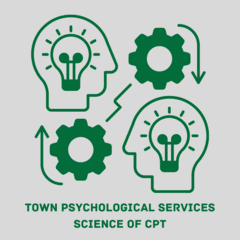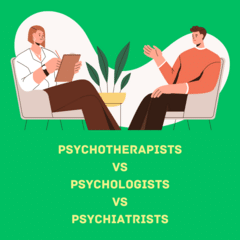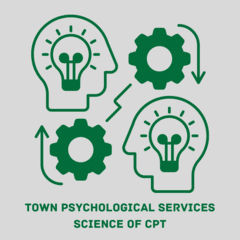Town Psychological Services
最近の記事

Can Cognitive Behavioural Therapy Helps Overcome Negative Thinking Patterns?
Welcome back to the Psych On The Mic, where we explore the mind, mental health, and practical ways to improve well-being. In today’s episode, we’re diving into Cognitive Behavioural Therapy (CBT) and how it can help you overcome negative thinking patterns. Whether you're struggling with anxiety,or depression, or just find yourself caught in a cycle of negative thoughts, CBT offers powerful tools to break free and improve your mental health. Follow https://townpsychology.ca/cognitive-behavioural-therapy/ But before we get into it, let’s quickly understand what CBT Therapy is all about. What is Cognitive Behavioural Therapy? Cognitive Behavioural Therapy (CBT) is a type of psychotherapy that focuses on the connection between our thoughts, feelings, behavioursiours. The core idea is that our thoughts can greatly influence how we feel and ac. So, if we can change negative or distorted thinking patterns, we can significantly improve how we feel and behave. For example, if you often think, "I always mess things up," this thought can lead to feelings of hopelessness or anxiety and may even result in avoiding challenges altogether. CBT helps you identify these unhelpful thoughts, challenge them, and replace them with more realistic, balanced ones. Why Negative Thinking Patterns Matter You might be wondering: why is negative thinking such a big deal? Well, negative thoughts can create a vicious cycle. They can lead to emotional distress, such as anxiety or depression, and they can affect how you interact with the world. The more we believe negative things about ourselves or our circumstances, the more we may begin to act in ways that reinforce these beliefs. Learn more https://townpsychology.ca/cognitive-behavioural-therapy/

Exploring CBT Therapy in Mississauga, ON
Welcome to another episode where we explore Cognitive Behavioural Therapy (CBT), a powerful and effective treatment approach available at Town Psychological Services. Designed to help individuals overcome challenges like anxiety, depression, and stress, CBT works by identifying negative thought patterns and reshaping them into more constructive behaviours and perspectives. Visit https://townpsychology.ca/cognitive-behavioural-therapy/mississauga/ to learn more. We’ll break down the science behind CBT, what makes it such a successful therapeutic method, and how professional CBT therapists in Mississauga personalize treatment to meet each client’s unique needs. If you are searching for “CBT therapy near me” and want to understand how it can improve your mental health and well-being, this episode provides key insights into what to expect from your therapy sessions. Tune in and discover how TownPsychology.ca is making a difference in the lives of individuals across Mississauga with proven CBT techniques.

What is Emotion-Focused Therapy?
Welcome to another episode of Psych On The Mic, where we will talk about a powerful therapeutic approach called Emotion-Focused Therapy, or EFT therapy for short. Know how EFT transforms your emotional well-being and why it might be the right fit if you're feeling emotionally overwhelmed, stuck, or simply searching for a deeper connection with yourself and others. Learn more https://townpsychology.ca/emotion-focused-therapy/ How Emotion-Focused Therapy Transforms Your Emotional Well-Being What exactly is Emotion-Focused Therapy? At its core, EFT is an evidence-based approach that helps individuals navigate their emotions healthier and more constructively. Emotions are central to our experiences—they influence how we think, react, and interact with the world around us. EFT teaches us how to identify, process, and transform these emotions, particularly the difficult ones that often cause distress or conflict. Unlike some forms of therapy that focus on changing thoughts or behaviours first, EFT zeroes in on the emotions themselves. This method allows you to understand what you're feeling and why, giving you the tools to regulate those emotions and build stronger emotional resilience. How does EFT Therapy work? So, how does Emotion-Focused Therapy work? The therapist works with you to bring awareness to your emotions—both the surface emotions you may be consciously aware of and the deeper ones that might be hidden beneath the surface. Through guided conversations, reflective exercises, and emotional processing techniques, EFT helps you peel back the layers of your emotional experiences. For example, let's say you're feeling constant anger or frustration in your relationships. While anger might be the surface emotion, EFT can help you uncover deeper feelings—perhaps sadness, fear, or vulnerability—that are at the root of your anger. Once you access and process these deeper emotions, you can begin to heal and respond in healthier ways. EFT and Emotional Transformation This process of emotional transformation is where the magic happens. Often, we carry emotional baggage without even realizing it—old hurts, unmet needs, unresolved conflicts—that weigh us down over time. EFT gives you a safe space to explore these emotions, release their hold on you, and create new emotional patterns that support your overall well-being. One of the key benefits of EFT is that it fosters emotional intelligence. You start to become more aware of your emotional triggers and develop healthier ways to cope with them. Instead of reacting impulsively, you learn to pause, reflect, and respond in ways that are aligned with your true needs. For example, if you struggle with anxiety, EFT can help you understand the underlying fears that drive your anxiety and guide you through processing those emotions. Over time, this leads to a sense of empowerment and emotional freedom. When to Seek a Mental Health Professional? Now, while all of this may sound empowering, it's important to note that emotional transformation doesn't happen overnight. Working with a trained EFT therapist can make all the difference. These professionals are skilled in guiding you through the often complex process of emotional healing in a way that's safe, compassionate, and effective. If you're feeling emotionally stuck or overwhelmed, or if you've been struggling with recurring emotional challenges in your relationships, it might be time to seek help from a mental health professional who specializes in EFT therapy. Remember, taking the first step toward healing is not a sign of weakness but an act of courage.

What is Dialectical Behavior Therapy (DBT)
Understanding What Dialectical Behavior Therapy (DBT) Is and Its Purpose - Welcome to another episode of Psych On The Mic, your essential guide to understanding this transformative therapeutic approach. DBT, developed by Dr. Marsha Linehan, is designed to help individuals manage intense emotions, build healthier relationships, and enhance their overall mental well-being. Learn more about https://townpsychology.ca/dialectical-behavior-therapy/ here. In this podcast, we delve into the core principles of DBT, explore its four key modules—Mindfulness, Distress Tolerance, Emotion Regulation, and Interpersonal Effectiveness—and discuss how each component works together to create meaningful change. Join us on this enlightening journey to discover the purpose and power of DBT. Who Needs Dialectical Behaviour Therapy (DBT)? Dialectical Behavior Therapy (DBT) is particularly beneficial for individuals who struggle with intense emotions, unstable relationships, and harmful behaviors. It is often recommended for: 1. Borderline Personality Disorder (BPD): DBT was originally developed for individuals with BPD, helping them manage emotional instability, impulsive behaviors, and relationship difficulties. 2. Self-Harm and Suicidal Behavior: Those who engage in self-harm or experience chronic suicidal thoughts can find DBT effective in developing healthier coping mechanisms. 3. Eating Disorders: DBT is used to treat individuals with eating disorders such as bulimia and binge-eating disorder, addressing emotional dysregulation that underlies these conditions. 4. Substance Use Disorders: Individuals struggling with substance abuse can benefit from DBT's focus on distress tolerance and emotion regulation. 5. Mood Disorders: People with depression, bipolar disorder, and anxiety disorders can find DBT helpful in managing their symptoms and improving emotional stability. 6. Post-Traumatic Stress Disorder (PTSD): DBT techniques can aid those with PTSD by helping them process traumatic experiences and develop coping strategies. DBT is also useful for anyone seeking to improve their emotional regulation, interpersonal skills, and overall mental health. Additional Resources https://www.bloglovin.com/@mackjohnson/exploring-your-options-finding-perfect-psychotherapy http://www.apsense.com/article/promoting-wellbeing-and-resilience-through-psychological-services.html https://newsabout.ca/how-to-find-the-right-cbt-therapist-in-ontario/

Psychologist, Psychiatrist, and Psychotherapist - Understanding Differences
Welcome to the 4th episode of Psych On The Mic from Town Psychological Services. Are you feeling overwhelmed by the different titles in the mental health field? You're not alone! In this episode, we will explore the difference between psychotherapists vs psychologists vs psychiatrists near me. We'll shed light on their educational backgrounds, what kind of services they provide, and the unique role each plays in your mental well-being. Follow this link https://townpsychology.ca/blog/psychotherapist-vs-psychologist-vs-psychiatrists/ for a complete guide. Here's what you'll learn: 1. The Power of Talk Therapy: Discover how psychotherapists, including psychologists and some psychiatrists, utilize various talk therapy techniques to address emotional challenges and navigate life's roadblocks. 2. The Medical Edge: We'll explore the role of psychiatrists as medical doctors who can diagnose mental health conditions and prescribe medication when necessary. 3. Beyond the Prescription Pad: Psychologists, while not medical doctors, hold advanced degrees and can provide psychotherapy, conduct psychological testing, and offer valuable insights into human behaviour. 4. Finding the Right Fit: We'll discuss how understanding the strengths of each profession can empower you to make informed decisions about your mental healthcare journey. Whether you're seeking help for yourself or a loved one, this episode is your guide to navigating the world of mental health professionals and choosing the right path to a healthier, happier you. So grab your headphones and tune in – it's time to break down those mental health acronyms! Additional Resources: http://www.apsense.com/article/promoting-wellbeing-and-resilience-through-psychological-services.html https://www.listvox.com/health/cognitive-processing-therapy-techniques/ https://townpsychological.livepositively.com/types-of-psychological-services-for-mental-well-being/ https://subjective.fitness.blog/2024/04/03/5-habits-scientifically-shown-to-reduce-anxiety/ https://newsabout.ca/how-to-find-the-right-cbt-therapist-in-ontario/

What is Cognitive Behavioural Therapy (CBT)?
Welcome to 3rd episode of Psych On The Mic where we delve into the world of Cognitive Behavioural Therapy (CBT) and explore its profound impact on mental health. In this episode, we uncover the essence of CBT, a widely used and highly effective form of psychotherapy. Join us as we break down the core principles of CBT, a treatment that focuses on identifying and challenging negative thought patterns and behaviors. Visit https://townpsychology.ca/cognitive-behavioural-therapy/ and learn how CBT empowers individuals to develop healthier thinking habits, cope with stress, and improve their overall well-being. We will discuss: 1. The Fundamentals of CBT: Understanding what CBT is, how it works and its key components, including cognitive restructuring and behavioural activation. 2. Applications of CBT: Exploring the diverse range of mental health issues CBT can address, from depression and anxiety to PTSD and OCD. 3. Real-life Success Stories: Hearing firsthand accounts of individuals who have benefited from CBT, showcasing its transformative potential. 4. Practical CBT Techniques: Simple, actionable strategies you can implement in your life's routine to enhance your mental health. Whether you're curious about CBT for personal growth, considering therapy, or simply interested in psychology, this episode provides valuable insights and practical knowledge. Tune in to discover how Cognitive Behavioural Therapy can be a powerful tool for positive change in your life. Subscribe to Psych On The Mic today, and embark on a journey toward mental clarity and emotional resilience with Town Psychological Services. Additional Resources: https://medium.com/@businesspad/key-pieces-of-cognitive-behavioral-therapy-cbt-d91e1d65a019 https://subjective.fitness.blog/2024/04/03/5-habits-scientifically-shown-to-reduce-anxiety/ https://newsabout.ca/how-to-find-the-right-cbt-therapist-in-ontario/ http://www.apsense.com/article/promoting-wellbeing-and-resilience-through-psychological-services.html

The Science Behind Cognitive Processing Therapy (CPT)
This episode dives deep into the science of CPT, explaining how it rewrites the script in your mind. No psychobabble, just practical strategies to finally break free from negativity. Join us and unlock the power to heal, thrive, and live the life you deserve. Follow https://townpsychology.ca/cognitive-processing-therapy/ to learn more The science behind Cognitive Processing Therapy (CPT) centers on the idea that our thoughts, emotions, behaviors, and bodily sensations are all interconnected. Here's a breakdown of the key concepts: Cognitive Processing: Our brains naturally try to make sense of experiences, especially traumatic ones. This processing can lead to the formation of beliefs about ourselves, the world, and the future. However, after trauma, these beliefs can become distorted and unhelpful. Cognitive Distortions: These are negative thinking patterns that can worsen our emotional state and hinder recovery. Examples include: 1. Jumping to Conclusions: Assuming the worst without evidence. 2. Emotional Reasoning: Believing your emotions are facts ("I feel worthless, therefore I am worthless"). 3. Catastrophizing: Blowing out of proportion the likelihood of negative outcomes. The Science of Change: CPT is built on well-established principles from cognitive psychology. Here's how it works: 1. Identifying Cognitive Distortions: The therapist helps you recognize unhelpful thinking patterns associated with your trauma. 2. Cognitive Restructuring: You learn to challenge and re-frame these distortions with more balanced and realistic beliefs. 3. Emotional Regulation: By changing your thoughts, you can learn to regulate your emotions and develop healthier coping mechanisms. Evidence for Effectiveness: Extensive research supports the effectiveness of CPT in treating PTSD and other conditions. Studies show CPT can significantly reduce: 1. Intrusive thoughts and memories 2. Avoidance behaviors 3. Negative emotions like depression and anxiety Brain Imaging: While research is still ongoing, some studies using brain imaging suggest that CPT may actually alter brain activity in areas related to emotional processing and memory. Overall, the science behind CPT emphasizes the power of our thoughts to influence our emotional state and overall well-being. By learning to identify and challenge unhelpful thinking patterns, CPT empowers individuals to take control of their mental health and build a brighter future.

Psych On The Mic
Ever wondered what goes on behind the closed door of a therapist's office? In this episode we ditch the stigma and dive into the world of psychology with an actual psychologist! We'll discuss about how therapy can help with everything from everyday stress to anxiety and depression. Visit https://townpsychology.ca to learn more about In coming episodes, we'll also explore different types of therapy and answer your burning questions like "Is therapy right for me?" and "What should I expect in a session?" So, grab your headphones and get ready to learn how to take charge of your mental health!







